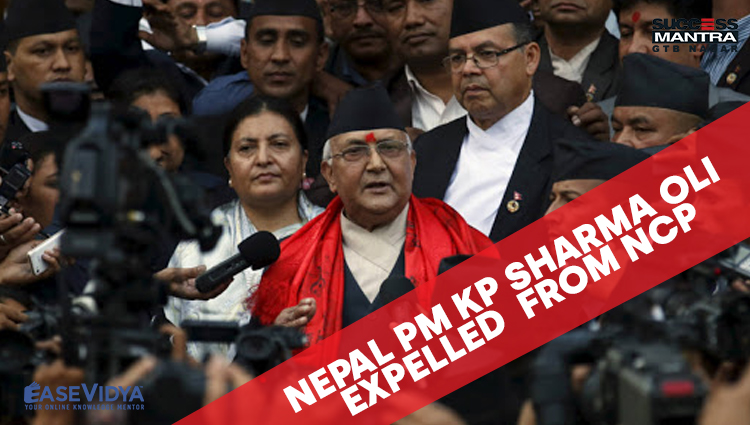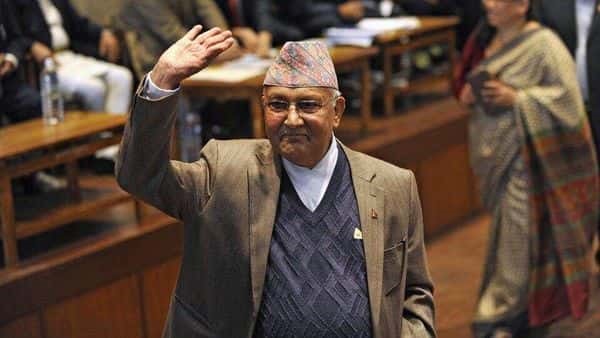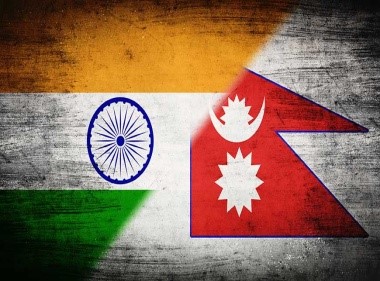
NEPAL PM KP SHARMA OLI EXPELLED FROM NCP
NEPAL PM KP SHARMA OLI EXPELLED FROM NCP

Nepal PM KP Sharma Oli has been expelled from the ruling Nepal Communist Party (NCP) over his decision to dissolve the Parliament. The Prime Minister was removed from the party by a Central Committee at a meeting of the party's splinter group held on January 24, 2021. The decision comes amid repeated threats by the rival faction leaders who had said that they would revoke Oli's membership over his decision to dissolve the Nepal Parliament. The rival faction spokesperson Narayankaji Shrestha said that the party leaders are planning further action against Oli after his ouster from the party.
ABOUT THE RECENT ISSUE (PM OLI EXPELLED)
The splinter group led by former Prime Ministers Pushpa Kamal Dahal and Madhav Kumar had earlier asked PM Oli for explanation for his unconstitutional decisions. The faction had event sent a letter to the Prime Minister's residence to seek clarification. However, PM Oli did not respond to the letter. The rival faction spokesperson said that they waited for long for a reply from the Prime Minister but he didn't reply to them. He added that the latest decision was taken by exercising the executive rights provided by the Central Committee of the party. Decisions by both factions didn’t come in line with party’s statute, so can’t update Nepal Communist Party's details. We've notified KP Oli & Pushpa Kamal Dahal, making it clear that Commission will maintain party's existing details
ONGOING POLITICAL CRISIS IN NEPAL
Recently, Nepal has drifted into a political crisis following its Prime Minister (PM) KP Sharma Oli’s decision to dissolve Parliament. The Nepalese PM has stated that this decision was on the backdrop of infighting within the ruling Nepalese Communist Party (NCP). As India’s role in the mediation of earlier political crises in Nepal has led to the development of anti-Indian sentiment in Nepal, India has done right by not meddling into Nepal’s internal matters. However, India is apprehensive that political instability in Nepal will expand space for China to intervene in Nepali politics and shape a government that is favourable to China. To counter Chinese influence on Nepal, India must pay attention to Nepal’s core economic and strategic interests that in the first place pushed Nepal towards China.
BACKGROUND OF THE NCP
Khadga Prasad Sharma Oli more commonly known as K. P. Sharma Oli, is a Nepalese politician and the current Prime Minister of Nepal. He previously served as Prime Minister from 11 October 2015 to 3 August 2016 and was the first elected PM under the newly adopted Constitution of Nepal. Oli spent most of his youth in jail in critical health condition fighting against the autocratic Panchayat regime. He is praised and considered a nationalist for standing against India during the 2015 Nepal blockade, strengthening relationship with China and publishing an updated map of Nepal including disputed territories with India by constitutional amendment. His hostility towards critics and inability to deliver in infrastructure development despite a historic majority in 2017 Nepalese legislative election is often criticized.
The Nepal Communist Party also referred to as NCP double, is the ruling political party in Nepal and is the largest communist party in South Asia and the third largest in Asia. It was founded on 17 May 2018, from the unification of two leftist parties, Communist Party of Nepal (Unified Marxist–Leninist) and Communist Party of Nepal (Maoist Centre). The unification was completed by the Party Unification Coordination Committee, after eight months of negotiation. The two predecessor parties subsequently dissolved, making way for the new united party. The party retains the electoral symbol of the CPN (Unified Marxist–Leninist), the sun. The party is the largest political party in the House of Representatives, National Assembly and in all provincial assemblies. K. P. Sharma Oli, Prime Minister of Nepal since 15 February 2018, and former Prime Minister of Nepal Pushpa Kamal Dahal both serve as the chairmen of the party.
However, soon after Oli announced his controversial decision, the NCP split into two factions and both claimed to be the faction that inherited the authentic essence of the party. The Election Commission of Nepal will now have to decide which faction will retain the election emblem of the "sun".
CURRENT ISSUES INDIA-NEPAL RELATIONSHIP

• Revision of 1950 Treaty: Nepal has asked for a revision of the 1950 treaty, and India has accepted this. However, the issue remains stuck because Nepal does not clarify how to strike a proper balance between India’s security concerns and Nepal’s developmental aspirations.
• Recent Border Issue: The Kalapani border dispute’s question has spoiled popular perceptions in Nepal about India. Taking advantage of this, Nepal’s current leadership has taken a unilateral decision to draw new maps which show Kalapani, Lipulekh, and Limpiyadhura belongs to Nepal. As India also claims these positions, this border issue has led to the lowest point in India-Nepal relations history.
• Tug of War Between China & India: Nepal’s geo-strategic location (sandwiched between India & China), has created a tug of war between India and China over Nepal. China sees Nepal as a bulwark against the international movement targeting China. For India, Nepal is essential for the region's security, acting as a buffer state.
• Increasing Chinese Influence: Sino-Nepali economic ties began to grow in 2015, but in 2018, China’s influence in Nepal started to gather momentum. Having played an essential role in the NCP’s formation, China came to wield enormous influence over the NCP government. It resulted in China ousting India as Nepal’s number one investor. More importantly, Nepal’s foreign policy under the NCP government became strongly pro-China. Moreover, this influence can be evidenced by the fact that China has now stepped up its self-assumed role as mediator in the ongoing crisis.













0 Comment